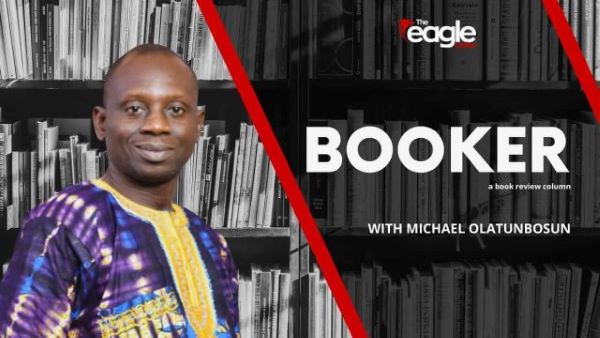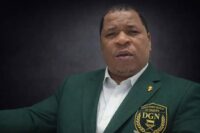The collection: “The Ones Before You,” is written by ‘Joba Ojelabi, a marketing and communications professional with a knack for storytelling. He is the Communications Lead at Agbowo, a literary organisation that amplifies creative voices across Africa. The collection was published in 2025 in Ibadan by Noirledge.
The collection contains 50 poems. And the first poem sets the stage for what is to come. In “Masquerade”, the poet persona says that you cannot satisfy everybody except you lose yourself. For the poet, to be that person who appears to all classes of people the way they expect is “to lose yourself behind masks”.
In the second poem: “For When Bella Doubts (p4),” the poet addresses the object of his admiration, Bella. He deploys what can be described as the paradox of the beholder to submit that lenses perceive differently, even when all perspectives are correct. So he argues here that poets behold beauty more intently than others, and that is why beauty is better perceived personally.
In this collection, the poet plays on the imagery of loneliness or aloneness. Responding to a quotation by the legendary Black American poet, Maya Angelou, the poet muses upon the difficult corner that a one-sided love boxes one. He avers (p6) that it is harder “to choose life with another/when they don’t choose you.” This essentially sums up the trauma one faces in a situation of unreciprocated love, friendship or relationship.
The theme of lonely abandonment continues its reverberation across the work in “Distractions” (p8), as the poet persona addresses the issue of rejection.
Also Read:
The collection is a beautiful portrait of women and celebration of womanhood. The poet’s eulogy describes women as “guardians of the cradle” conferring on them also spiritual acumen by calling them collectively “the cult” whose ears perceive even the unspoken. The poet, in this poem, “Abiyamo”, calls upon his Yoruba roots and the Yoruba cosmology to convey his high calling of the women. He burrows deep into the metaphor of long girdle (p12) attributed to mystical powers of mothers. Hear the poet’s reverent chant:
“You don’t want to experience their wrath
for if a mother shouts, time stops and hearts shiver
But even their shout rarely conveys annoyance
Their true vexation lies in their louder silence.”
Of course, a perceptive reader will notice that many poems in this collection are about women. There are lines addressed to lovers, to mothers, sisters and girls. In some of the poems, the poet persona simply muses about his inability to get an answer to his advances, or simply just sings flirtatious tunes. For instance, in the poem “Cats and Hearts” (p12), it appears like the poet persona is wooing the object of his admiration who is feigning ignorance. He wonders why this person is hiding “behind your shade of words/And peep at the words I ward” but he quickly warns that he has not stopped the chase. He enthuses: “…if I catch your curious cat/only death can do us part.”
The poet’s preoccupation with the anatomy of a woman is top-notch. Having been ravaged and ravished over time by women, the poet persona seems to explore their physique to the extent of making prescriptions about handling them. In the poem “How to Love a Thick Lady” (p24), the poet persona has a humorous, light-hearted counsel for his friends. He opines that a man who falls in love with a lady with extra skin must espouse euphemisms that will lift her spirit even if in reality he fails “at sweeping her off her feet”. He says that you are safe as long as you don’t body-shame her, even if you get into a fight.
The next poem (p24) is a delicious balance on the scale of size though. The poet paradoxically sings an awe-song about “Small Packages” and how they can be “a handful” even though they are precious.
Indeed there is a recurring paradox of love in this collection. The poet persona seems to be about the business of either loving or lying about it.
The title poem in the collection (p14) is a personal confession penned to a young, imaginary daughter, Asake. In it the poet persona addresses his past escapades and promiscuous stints with several “daughters of Eve” even in the cuddle of his jealous lover who has to endure his excesses with other women. He wishes his beloved Asake would grow into a beautiful woman too and be strong.
In the collection: “The Ones Before You,” ‘Joba Ojelabi writes about immortality, and the cycle of life. In this poem tagged “Time Does Not Fly”, the poet discusses how time simply ticks away, dragging us along even though we seem not to know that. In another poem, the subject of mortality and the ephemeral nature of life stares the poet persona in the eyes. In the poem, “How to Bury an Old Woman” (p28) written for Grace Adedunmola Ojeniyi, the poet persona discusses the certainty of death. The poet also wonders about the contradictory nature of throwing parties in public when our loved ones die but also silently weeping when all is done.
This work is a canvas of paradoxes. While the poet persona is preoccupied with the paradox of love, supplying the reader with mouthfuls of it, he also deals with the paradox of death and life. In the poem, “Aiku” (p30), the poet muses about death as the corridor that leads to life: “Death is the way to life.” Again, he quotes: “Death without dying/Involves just one major thing:/Life without living.”
In the collection, the poet writes verses for the dead, friends and loved ones, and the living. He writes about the common, relatable everyday people and situations and of course, the different shapes and shades of relationships.
This collection is significantly outstanding in the sense of its musicality and the poet’s deployment of both internal and end rhymes. Most of the poems are either spruced in alliterative majesty or intricate rhymes. For example, “A Nomad’s Ghazal” (p10) is a poem written in five couplets, with all the lines ending the words that rhyme. The next one, “The Girl from My Poems” has six couplets with alternate end rhymes.
Ultimately, all the poems in this collection form a chain of lines intricately penned and loaded with surplus imagery and vivid verve by a poet with artistic attitude.
The Ones Before You is a collection with spirit and candour.
. Olatunbosun is a broadcast journalist, fact-checker and book reviewer at Splash FM 105.5, Ibadan. He can be reached via 08023517565 (SMS and WhatsApp only) and email: molatunbosun@splashfm1055.com.
Post Views: 17



















Leave a comment